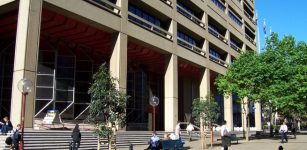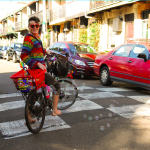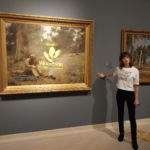NSW Courts Refuse to Convict Homeless Man

In February 2012, Mr Lanz Priestley was charged with two offences for “staying overnight” in Sydney’s Martin Place on two consecutive evenings. The City of Sydney council had erected notices in the public mall prohibiting “camping or staying overnight” in the vicinity.
Priestley was charged under Section 632(1) of the NSW Local Government Act 1993, which provides that “a person who, in a public place within the area of a council, fails to comply with the terms of a notice erected by the council is guilty of an offence.” The offence carries a maximum fine of up to $1,100.
The court heard that Mr Priestley had been living on the city streets since 1992. On the nights in question, he was part of the Occupy Sydney movement. The Occupy group were demonstrating in Martin Place, or in “occupation” of the mall.
At times during these nights, Priestley appeared to be lying down in a sleeping bag. At other times, he was seen to be sitting up and walking around. While on the second night he was seen underneath an awning that was part of a commercial building situated opposite Martin Place.
The initial court hearings
On 17 May 2012, Local Court Magistrate Barkell dismissed the charges against Priestley. Her Honour found that the “staying overnight” prohibition notice indicates “that you remain in one place” and Mr Priestley had not done so, as he had departed Martin Place at various times during the two evenings.
The Director of Public Prosecutions (DPP) then appealed the case at the NSW Supreme Court. On 24 April 2013, Justice Adams dismissed the appeal. His Honour found that “staying overnight” meant using the area as accommodation, and was not confined to sleeping.
However, Justice Adams ruled that the council notice didn’t outline when a person was prohibited from “staying,” and therefore doesn’t allow an individual to know “when their conduct has become criminal.”
Trying to prosecute the homeless
So the DPP then appealed the Supreme Court outcome to the NSW Court of Appeal (NSWCA) in February 2014, where Justice Gleeson found that there must be a reason for the appeal other than “the primary judge was arguably wrong in the conclusion.”
The DPP applied for leave (permission) for the matter to be heard, as it “raised a question of general public importance.”
The question was whether a person using the area “as de facto accommodation for a substantial portion of an evening would infringe the prohibition on ‘staying overnight,’” even if that person “does not remain… continually from dusk until dawn.”
The court heard that the importance of raising this question was that there were seven other people charged with the same offence in the vicinity of Martin Place. And all of the accused were to go before the Downing Centre Local Court in May that year.
The facts supporting the charges
The NSWCA heard that the evidence in support of the first charge of “staying overnight” on 1 February 2012, was comprised of CCTV stills, as well as police statements that outlined officers had seen Mr Priestley getting out of his sleeping bag at 6 am under a makeshift shelter.
During the course of the night, Mr Priestley had left to go to Wynyard Station to distribute blankets. He had also gone to a convenience store on Hunter Street to buy a coffee, and had visited a food van in Martin Place, a block down from where police alleged he was staying.
The evidence for the second charge on the following night was based on the observations of a single police officer.
The officer said he saw Mr Priestley setting up a structure in Martin Place at 9.50 pm. Later in the morning at 1.30 am and 6.40 am, the same officer had allegedly seen Priestley up and walking around.
The only time Priestley was actually seen to be sleeping was at 4.45 am, when the officer saw him in a sleeping bag outside the Channel 7 studio window. But the prosecution failed to prove that the area outside this building was in fact public space.
For this reason, Justice Gleeson found that there was absolutely “no error in the second charge being dismissed” by the magistrate.
The NSWCA ruling
Justice Gleeson said that “staying overnight” does not necessarily mean that a person cannot leave the place where they’re passing the night. But “difficult questions could arise as to the boundaries of the conduct which might be prohibited by the notice.”
His Honour gave examples of conduct that might also be prohibited. These included students participating in a sit in, people who have missed the last train, others waiting to purchase tickets at a ticket booth, and those waiting for an early morning outdoor event.
While “an element of ‘accommodation’ might be said to be present in some of these examples,” Justice Gleeson reasoned, Mr Priestley’s behaviour was “quite different.”
On the question of whether this appeal raised a question of public importance, in light of these other behaviours that might contravene the notice, His Honour thought not.
“In my view, this is not an appropriate case for a grant of leave to appeal,” Justice Gleeson declared. And the following reasons were given.
Firstly, in regards to the charges that were pending against seven other people, His Honour reasoned that it was not known whether these would involve a question of “staying overnight,” as opposed to “camping.”
Secondly, the appeal was going to be merely “academic,” as the DPP were not seeking for the matter to be remitted to the “Local Court to be determined in accordance with the law.”
And lastly, Mr Priestley’s case was an inappropriate “‘test case” to determine what particular conduct is prohibited by the notice,” as the second charge was properly dismissed and the facts around the first charged were deemed unsuitable to determine the boundaries of such conduct.
No grounds for prosecution
As noted during the NSWCA proceedings, Mr Priestley is not the only individual in Martin Place to have been charged with failing to comply with the City of Sydney council notices. In connection with Occupy Sydney, at least one hundred people were charged on the same offence, but none were convicted.
And the NSW Court sentencing results suggest that neither the council, nor the state, were able to prosecute people for demonstrating in a public space.
Sydney’s 24-7 Street Kitchen and Safe Space
Mr Priestley is currently running Sydney’s 24-7 Street Kitchen and Safe Space, which is a free service providing food and shelter to the city’s rough sleepers. The setup has actually been raided on four occasions by the City of Sydney homelessness unit, accompanied by NSW police.
Despite the raids, the street kitchen continues to provide services to around 400 to 500 people a day, while they also provide a safe place to sleep for about 38 to 50 people each evening. They’ve got an ongoing call-out for donations, and they can be reached on this number 0410 722 000.
In regards to the outcome of his case, Mr Priestley told Sydney Criminal Lawyers® that he believes the council now has “less than 100 percent faith in their ability to prosecute” their current street kitchen and safe space setup under their regulations.
“The council probably don’t have very much confidence in their ability to prosecute a case against us,” Mr Priestley said. “They’ve never once served a breach notice on what we’re operating here, nor have they served up any criminal charges.”







